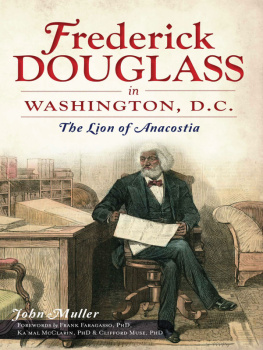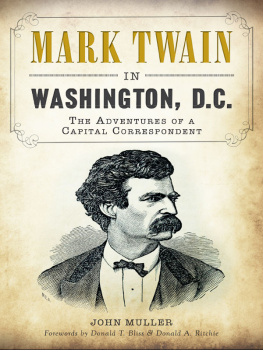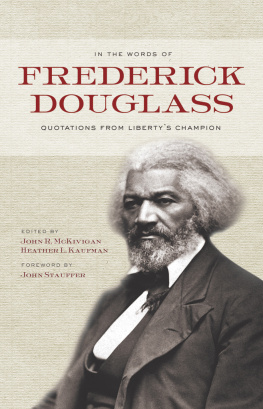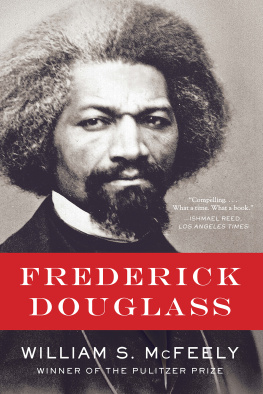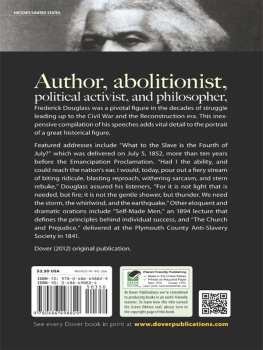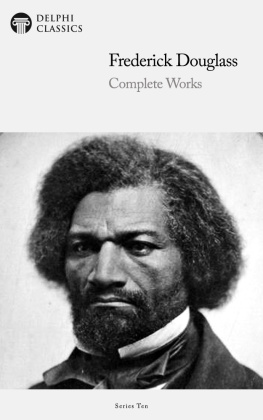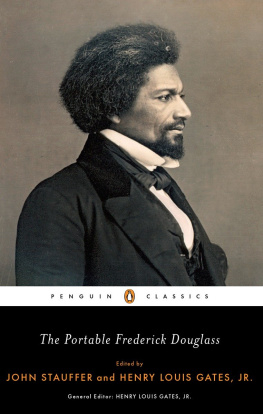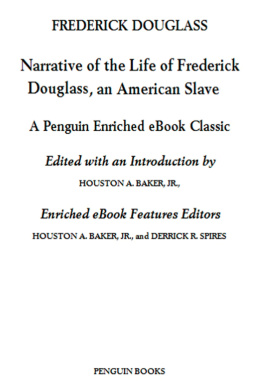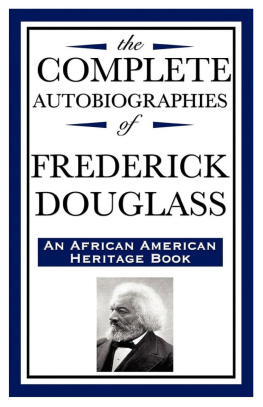Published by The History Press
Charleston, SC 29403
www.historypress.net
Copyright 2012 by John Muller
All rights reserved
Frontispiece photo collage by Matthew Parker.
Cover image: Marshal Frederick Douglass at his desk in city hall. Print watercolor from Frank Leslies Illustrated, December 13, 1879. Authors collection.
First published 2012
e-book edition 2012
Manufactured in the United States
ISBN 978.1.61423.713.6
Library of Congress CIP data applied for.
print ISBN 978.1.60949.577.0
Notice: The information in this book is true and complete to the best of our knowledge. It is offered without guarantee on the part of the author or The History Press. The author and The History Press disclaim all liability in connection with the use of this book.
All rights reserved. No part of this book may be reproduced or transmitted in any form whatsoever without prior written permission from the publisher except in the case of brief quotations embodied in critical articles and reviews.
Foreword
Since the death of Frederick Douglass in February 1895, much has been written about his extraordinary life. There are several full-length biographies and hundreds of articles. Early biographies by James Monroe Gregory, Frederic May Holland and Charles Chesnutt are still useful. Benjamin Quarless 1948 book, Frederick Douglass, was the first biography written by a professional African American historian. Philip Foners biography and collection of Douglasss writings was an important first step for scholars. Dickson J. Preston, an investigative journalist, provides groundbreaking insight into Douglasss early life in his 1980 book, Young Frederick Douglass: The Maryland Years. William S. McFeelys Frederick Douglass, published in 1991, is a comprehensive study by a Pulitzer Prizewinning historian. David Blights well-written Frederick Douglass and the Civil War: Keeping Faith in Jubilee was also published in 1991. The exhaustive gathering of Douglasss speeches, interviews and writings by John Blassingame is a true achievement. Numerous articles and essays appeared in 1995, the centennial of Douglasss death. In recent years, an essential cluster of books (and a play performed at Fords Theatre) has emerged that examines the relationship between President Abraham Lincoln and Frederick Douglass. Significant scholarship is expected in the coming years as the bicentennial of Douglasss birth approaches.
Despite all that has been written, John Muller shares in this new work the first thorough study of the years the Sage of Anacostia lived in Washington, D.C. Mullers work is critical to understanding Douglasss later years. During this time period, from 1865 to 1895, Douglasss life underwent dramatic shifts that were nothing short of seismic. When he first came to the District of Columbia, Douglass did not come to stay. He came, off and on, to run the New National Era, the first national newspaper for African Americans. Douglass and his family considered Rochester, New York, to be home. But when their house was destroyed by fire in 1872, Douglass decided to make a permanent move to Washington, D.C. That single decision changed his life. The Civil War had ended eight years earlier. The District of Columbia was becoming a true center of national power. For the ambitious, there seemed to be no better place. Congress had passed the Thirteenth, Fourteenth and Fifteenth Amendments, which were essential to ensuring that the protections of the United States Constitution applied to the more than four million Americans now fully recognized as citizens.
Douglass often said that without the vote, freedom for African Americans was meaningless. He believed they had to be active in the political system if they were to achieve equality and wealth. With this in mind, Douglass did what he could to cultivate new leadership among the younger generation of African Americans. For many years, he was involved with students at Howard University. While causes consumed much of his time and energy, Douglass did find time for his first loves: home and family. He purchased Cedar Hill, a sprawling estate in Anacostia complete with a Victorian mansion, in the fall of 1877. The house eventually included a library, a nursery and a kitchen. It was spacious enough to shelter his large family, and it welcomed everyone who entered. For a former slave to purchase such a home was, before Douglass, unthinkable. It was also unthinkable, for many, that this same former slave might marry a white woman, but that is precisely what Douglass did. After the death of his first wife, Anna, he married a college-educated white woman, Helen Pitts of New York.
As the most influential African American of the nineteenth century, Frederick Douglass championed many causes for his people. In other words, he did not forget his roots. He also championed his family by providing them with a home rivaling that of any white man at the time. Without question, Douglass dared to live and love in and across the color line. He did all of this in his later years, after he moved to the District of Columbia. We are fortunate that John Muller, through his pioneering and spirited research, makes those years come alive.
Frank Faragasso, PhD
July 2012
Frank Faragasso was the historian for the National Park Services Frederick Douglass National Historic Site in Washington, D.C., for sixteen years. During his tenure, Dr. Faragasso promoted an understanding of who Douglass was and why he is important to our history. To this end, Dr. Faragasso organized the first international conference on Douglass in 1999. He has also partnered with other agencies and private organizations to produce conferences and dramatic presentations, spoken to groups of all ages and conducted tours at various locations. Although retired, Dr. Faragasso maintains an interest in Douglass and his time.
Foreword
From this vantage ground [Cedar Hill], I have a magnificent view of the most magnificent city [Washington, D.C.] on the continent; I view, also, the history of the country for a half century as well as the history as it transpires from day to day.*
Frederick Douglass, September 1892
Cedar Hill was Frederick Douglasss final home. Also known as the Frederick Douglass National Historic Site, this twenty-one-room Victorian mansion and its surrounding eight acres are among Americas national historic treasures. Located in the heart of Historic Anacostia in the nations capital, Cedar Hill, Douglasss home of the last seventeen years of his life, represents his crowning achievement and progress. It signified to the world the heights to which Douglass had risen by the end of his life as the Sage of Anacostia. Providing him and his family spiritual and physical fulfillment, Cedar Hill was their suburban oasis. Standing atop an expansive hill, the residence itself is renowned as Americas emblematic Watch Tower of Freedom. Off in the distance to its far left is a beautiful view of the United States Capitol.




